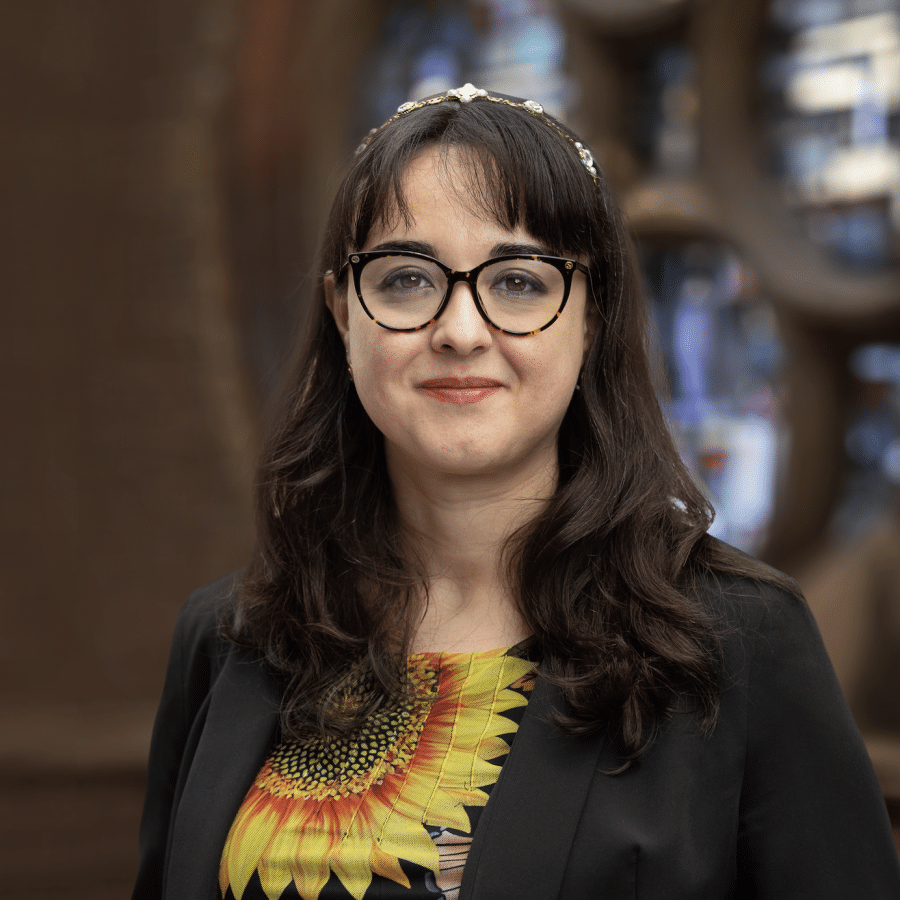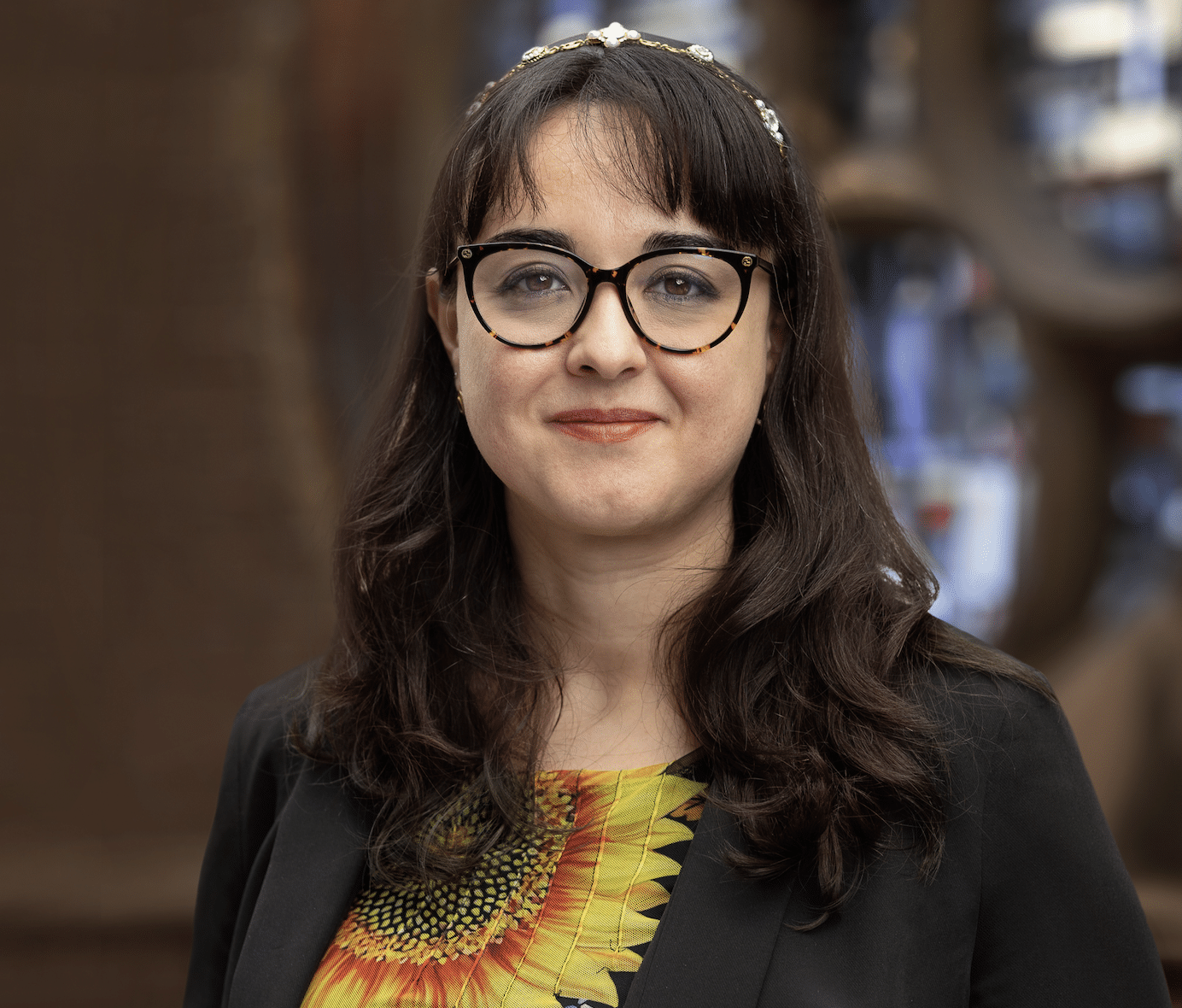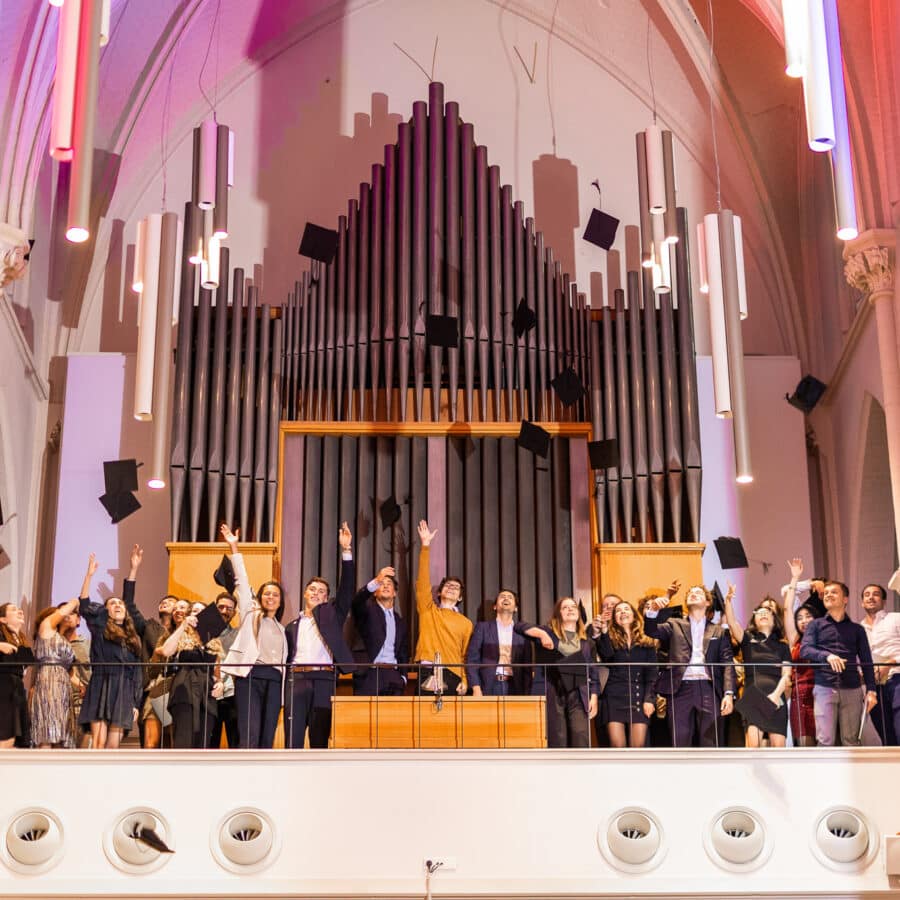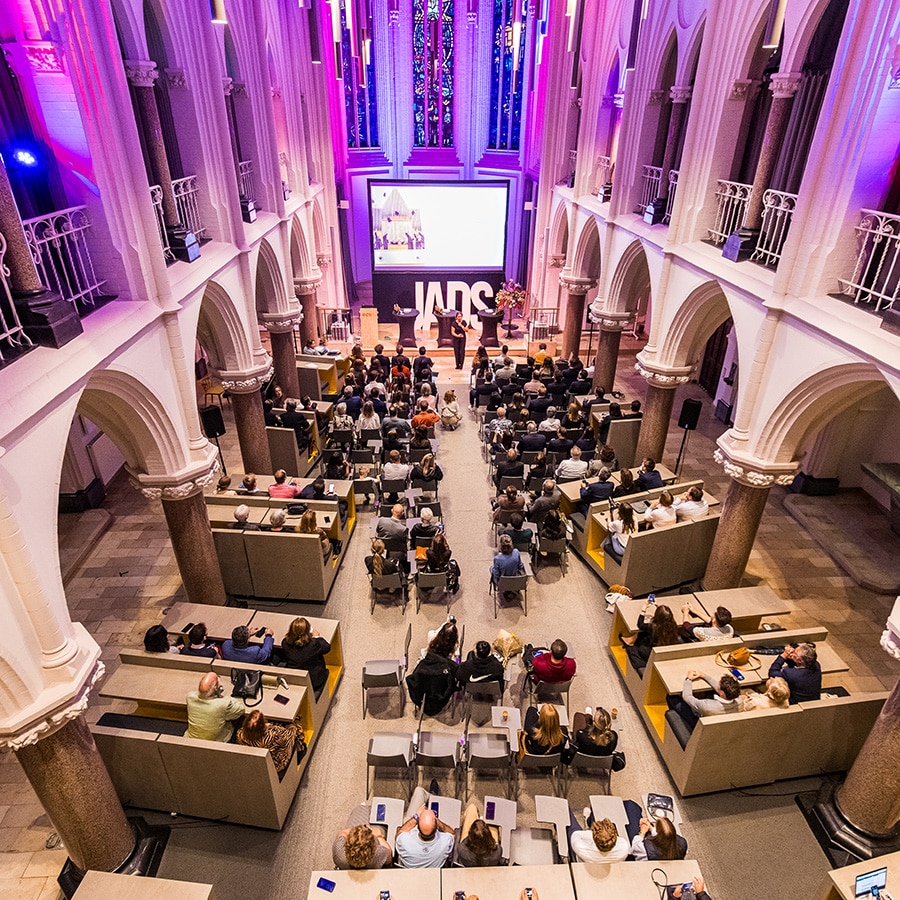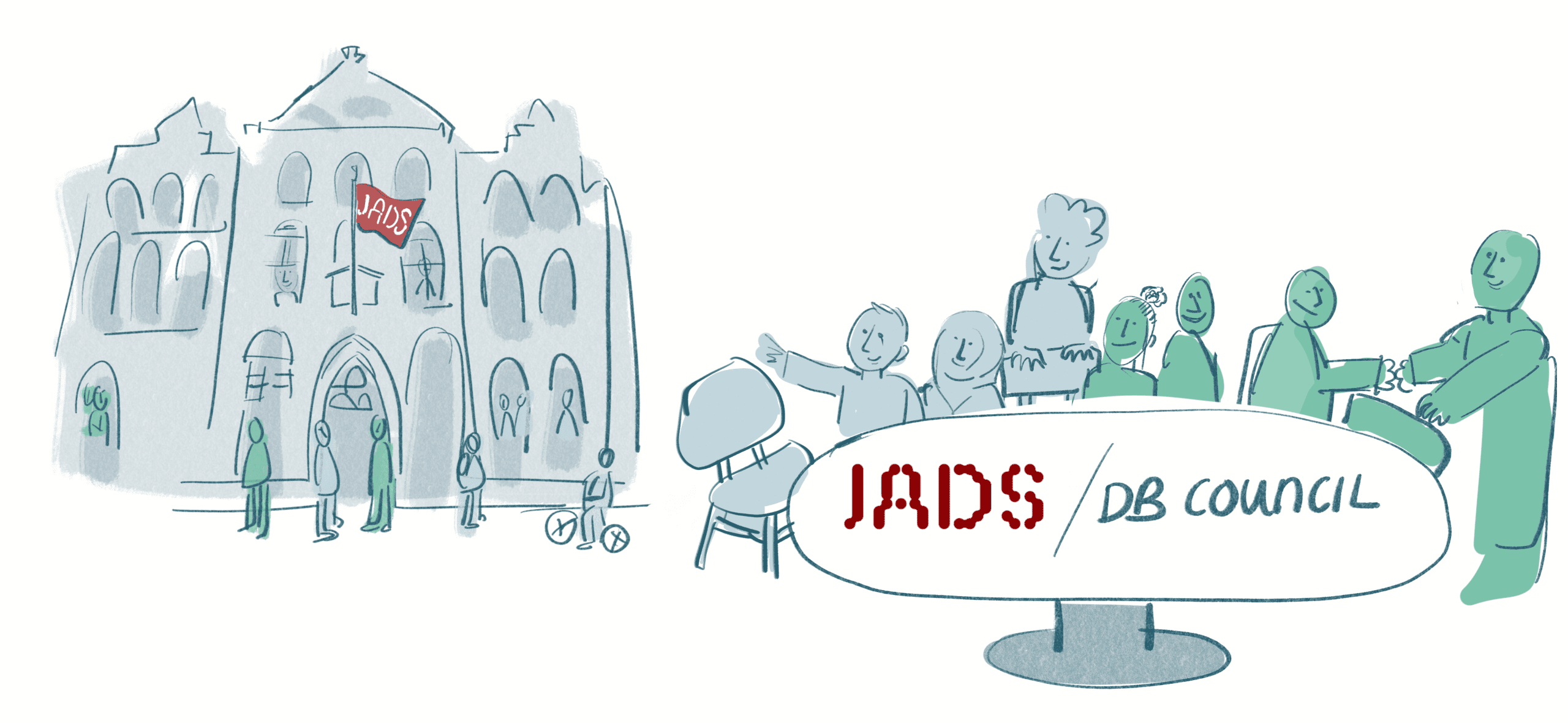
JADS/db council
A Council for JADS in Den Bosch
Employees and students want to be able to have a say in their own workplace or study environment. To facilitate this, each faculty has a School Council and each education program has a Program Committee. Up until 2023, JADS did not have its own participation body or council. On 14 December 2022, the Faculty Councils, University Councils and Executive Boards approved the Participation Regulations of the new JADS/db council.
What is the JADS/db council?
The JADS/db council meets with the management team four times a year to discuss matters relating to the program, the workplace and study environment. The council will also be asked for advice on matters such as the budget and the general frameworks for education and research. The council is also the Program Committee for the Master’s program Data Science in Business and Entrepreneurship and must be consulted to approve the Education and Examination Regulations (OER).
More information
More information can be found in the FAQ and Documentation below. If you have any questions, send an e-mail to: jads.electoralcouncil@jads.nl
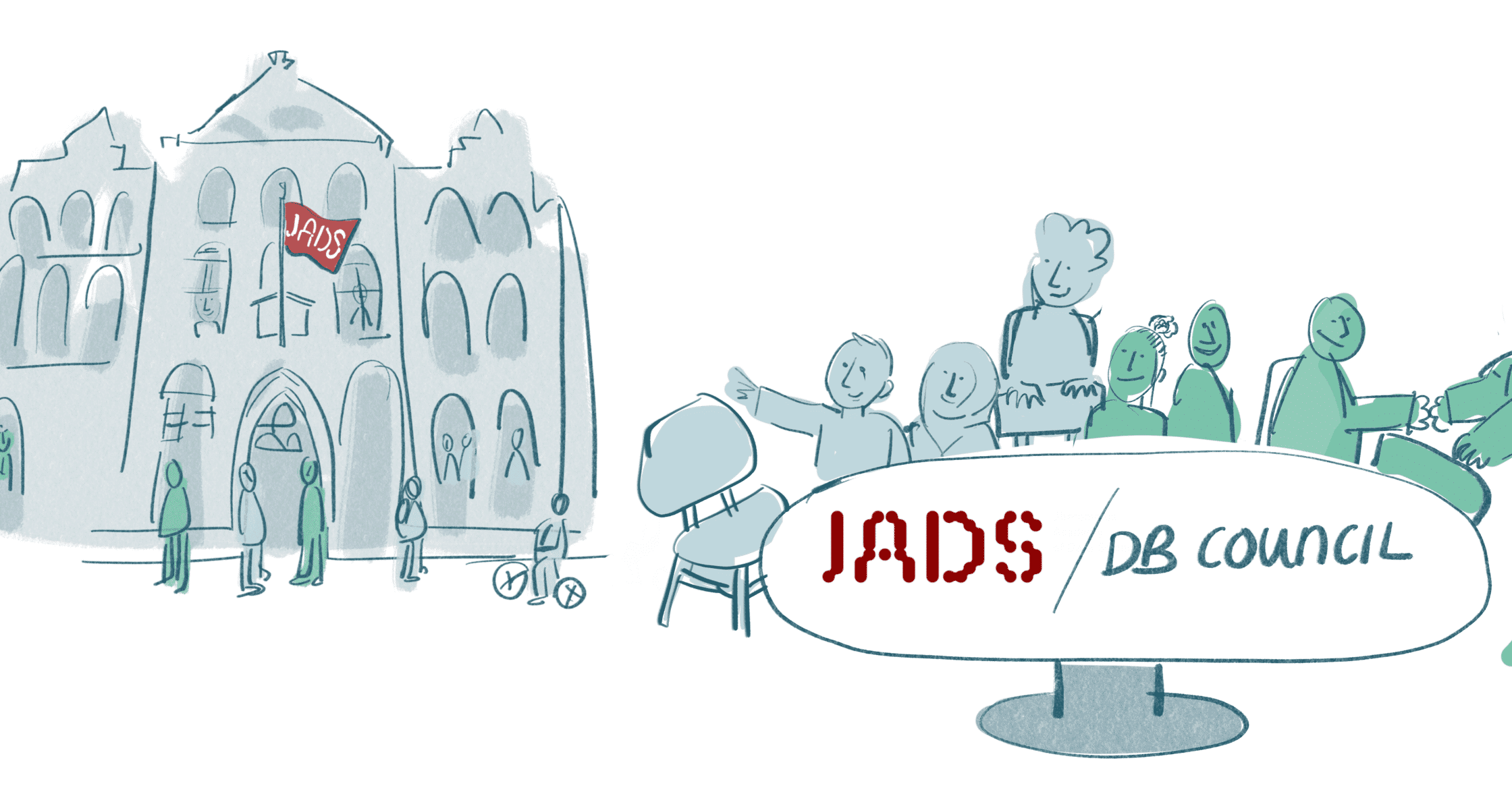
FAQ - General
The council has a number of tasks and powers:
- Promoting co-determination and participation, consultation and openness, a socially safe working and study climate and combating discrimination
- Right of consent to the Participation Regulations and the Education and Examination Regulations
- Advisory right on matters affecting JADS/db, budget of JADS/db, general frameworks for education and research and annual financial accountability of JADS/db. The council is also consulted for advice on the profile of a new member of management to be hired. Personnel have an additional right to be advised about, among other things, working conditions and the organization of work.
- right to take own initiative by putting matters on the agenda of the board
The council consists of four elected students, two elected members from the academic staff and two elected members from the support and administrative staff.
This means that the council also discusses the education and examination regulations (OER) with the program director and must approve changes to the OER. Only the two members of the academic staff and two student members have right to vote in this case.
The council speaks with the management team, with the academic director as the formal discussion partner; the program director is the discussion partner for matters in which the council fulfills its role as Program Committee.
The Council meets at least four times a year with the Management Team, who draws up a meeting schedule for this. Some of these meetings are devoted to subjects that the Council fulfills in its role as Program Committee. In preparation, the Council can also meet itself if desired; the preliminary consultations. Finally, the council can arrange an extra meeting if the chairman or two members of the council wish.
The council functions as much as possible as a School Council (Faculteitsraad) and has been given the mandate by the five School Councils to independently discuss, advise or agree on matters that concern JADS/db. The JADS/db Council is not accountable to the School Councils. Determining the financial frameworks and changes to the Joint Regulation is limited to both University Councils. The Participation Regulations include the possibility to organize a theme meeting with the University Councils once a year.
All students of the Master’s program in Data Science in Business and Entrepreneurship who are registered as of the reference date can apply for the student section. According to the Elections Regulations, the reference date is October 1.
Employees must perform at least 50% of their work for JADS/db on the reference date in order to apply.
FAQ - The elections
Elections are organized by the Election Committee; two council members who have been asked for this by the management team. After the reference date, they determine who has the right to vote and who may be elected. They announce this to the organization. After that, anyone who is eligible can apply. The Election Committee has a digital form to do this. The Election Committee also announces the final date to apply. They draw up three electoral lists: one for students, one for academic staff and one for support and administrative staff.
During election week, everyone who has the right to vote can cast 1 vote for a candidate from their own section. After the elections close, the Election Committee determines who is elected in the JADS/db council based on the highest number of votes. Candidates who were not initially elected are asked, in the order of the number of votes they received, if a vacancy arises within a section.
If you want to apply, please send an email to jads.electoralcouncil@jads.nl and include your full name, and if you are a Master student or a JADS employee.
There are elections every year, because the term of office of students is 1 year. You can, however, stand for re-election. The term of office of employees is two years, but if there are interim vacancies that cannot be filled, elections are also held for the vacant positions of employees. If less than 5 members are left on the JADS/db council, interim elections will be held.
For students 1 year (January 1 to December 31), with the possibility of re-election. The term of office for employees is 2 years, with the possibility of re-election.
In contrast to many School Councils, the term of office does not start on September 1, but has been chosen in the regulations for January 1 due to the short duration of the Master’s program (2 years) for students. By starting on 1 January, students will have already gained some experience with their studies and the term of office will end a few months before the completion of their studies.
There are four scheduled Council meetings with the management team:
March: on the agenda are: getting acquainted and discussing the annual plan
May: at least the OER and the financial accountability will be discussed
September: On the agena is at least the draft budget for the coming year
November:
FAQ - Council membership
Being a Council members means talking to the management team about matters that concern education and research within JADS/db. You will be asked for advice on a number of subjects (see above) or you will have to give permission, for example a change in the OER. But you can also punt matters on the agendathat you come across while studying or working at JADS/db. This can be done via the chairman of the JADS/db council or via the official secretary.
That’s hard to say. But if you assume four meetings a year of 2.5 hours each and a joint preparation and coordination of 1.5 hours, plus 4 hours for reading the documents, you end up with 8 hours per meeting, so about 32 hours per term.
Your period in the Council will be very informative and instructive period. And you can exercise influence over your study or working conditions. In addition, both universities have a scheme for reimbursement or exemption from work (for staff members).
Article 6 of the participation regulations stipulates that your study or career may not be adversely affected by your membership. It turns out that the experience you gain in a (School) Council is often very useful in your later career.
An official secretary is made available who takes care of the agendas, the reports, the invitations and an annual report. There is a possibility to receive training, where you learn, for example, how to hold meetings, read or understand documents or how to express your opinion. In case of difficult subjects, the Council can ask an expert to help.
– The Participation Regulations outline the composition of the council, the way of working and the powers. The regulations determine for whom the council has been set up and how the seats are distributed, who the discussion partner of the council is, provisions regarding elections and the term of office, protection against disadvantage, right of information and confidentiality, the powers of advice and consent, the powers of the council in the role of program committee, meeting and objection procedures and facilities, such as an official secretary.
– The Elections Regulations decribe the way in which elections are organized.
– The Preamble gives a description and explanation of the intentions of the JADS/db council
– university regulations and facilities state which reimbursement and other facilities you are entitled to. It has been agreed with the management team of JADS/db that these will be generously applied if one regulation turns out to be less favorable than that of the other university.

Documentation
- Official report JADS Council election 2024 (PDF)
In this official report, the outcome and the course of the JADS council election, which has taken place during the period of Monday December 2 until Friday December 6 2024, is reported. - Preamble (PDF)
This document gives a description and explanation of the intentions of the JADS/db council. - Elections Regulations (PDF)
This document describes the way in which elections are organized. - Participation Regulations (PDF)
This document outlines the composition of the council, the way of working and the powers. The regulations determine for whom the council has been set up and how the seats are distributed, who the discussion partner of the council is, provisions regarding elections and the term of office, protection against disadvantage, right of information and confidentiality, the powers of advice and consent, the powers of the council in the role of program committee, meeting and objection procedures and facilities, such as an official secretary
